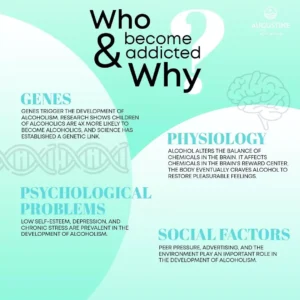Alcohol Addiction and Treatment

Alcohol Addiction Help in North Florida
Augustine Recovery specializes in understanding and overcoming the long-term effects of alcohol addiction for sufferers and their loved ones.
At Augustine Recovery, we have built a program specifically for those seeking a transformative experience in a life of sobriety. Our individualized treatment plans use approaches proven to help break the addiction cycle, deal with co-occurring disorders, process trauma, and build healthy life skills.
Our long-term treatment facility in St. Augustine helps address the unique challenges men face when alcohol becomes an unmanageable problem.
Understanding Alcohol Abuse
The most common phrase for someone with alcohol addiction is “alcoholic,” but the stigma and context of that word don’t encapsulate the bigger challenges that lead to sober solutions.
The clinical name was changed to Alcohol Use Disorder in 2013 by the American Psychiatric Association.
Alcohol use disorder (AUD) is a medical condition characterized by an impaired ability to stop or control alcohol use despite adverse social, occupational, or health consequences.
AUD encompasses both addiction and dependence with classifications of mild, moderate, or severe.
How is Alcohol Addiction Treated?
Our proven approach helps you to identify trauma, emotional difficulties, relationship issues, and other factors that have contributed to your substance use. Our staff members will then help you to process, address, and overcome these dynamics for lifelong sobriety.
Specific examples include:
- One-on-one therapy sessions
- Expressive and experiential therapy
- Education about addiction and recovery
- Proper nutrition and regular consultation with dietary staff
- Group sessions to teach behavior modification and emotion management
- Family therapy (family participation optional)
- 12-Step facilitation
- Onsite and offsite 12-Step meetings
- Weekly psychiatric consultations
- Trauma awareness and recovery
How Alcohol Addiction Happens
For some, having a drink is a casual choice—a way to unwind or celebrate. But for others, alcohol becomes more than that. It starts as an escape, a way to cope, or a habit that quietly grows into dependence.
Over time, the body and mind can crave the effects of alcohol, making it harder to stop. What begins as occasional use can turn into a cycle that’s difficult to break, not because of weakness but because addiction rewires the brain.

Why Can’t People Just Quit “Cold Turkey”?
Quitting “cold turkey” isn’t just about willpower—it’s about biology.
FACT: Long-term alcohol use rewires the brain, creating a dependence that’s physical, emotional, and psychological.
FACT: When someone suddenly stops drinking, the body goes into shock, leading to withdrawal symptoms that can range from intense cravings and anxiety to life-threatening seizures. It’s not a lack of determination; it’s the body fighting to adjust without the substance it has come to rely on.
FACT: This is why professional support is often essential—not just for safety, but to provide the tools and guidance needed for lasting recovery. Quitting isn’t easy, but it is possible with help.
Alcohol Addiction Root Causes
While anyone can develop alcohol use disorder, certain factors increase the likelihood for some people. It’s not just about choices—it’s a complex mix of genetics, environment, and personal experiences.
Here are some common risk factors:
- Family History: Genetics plays a significant role. If close relatives struggle with alcohol addiction, the risk is higher.
- Mental Health Challenges: Conditions like depression, anxiety, or trauma can lead some to self-medicate with alcohol. This is called a co-occurring disorder or dual diagnosis.
- Early Exposure: Drinking at a young age increases the chance of developing dependency later in life.
- Environment: Growing up in an environment where heavy drinking is normalized can influence habits.
- Stress Levels: Chronic stress, combined with a lack of healthy coping mechanisms, can lead to reliance on alcohol.
It’s important to remember that risk factors don’t guarantee addiction, just as the absence of these factors doesn’t provide immunity. Everyone’s journey is unique, and recognizing the signs early is key to seeking help.
Alcohol Abuse Long-Term Effects
Alcoholism can have profound effects on a man’s physical health, mental well-being, relationships, and overall quality of life. Mentally, it often causes or exacerbates anxiety, depression, or unresolved trauma.
Socially, it can strain or destroy relationships, harm careers, and lead to isolation.
- Liver Damage: Prolonged alcohol use can lead to fatty liver, hepatitis, cirrhosis, or liver failure.
- Heart Problems: Increased risk of high blood pressure, irregular heartbeat, cardiomyopathy, and stroke.
- Digestive Issues: Damage to the stomach lining, ulcers, and an increased risk of pancreatitis.
- Brain Function: Memory loss, cognitive decline, and an increased risk of dementia.
- Weakened Immune System: Greater susceptibility to infections and slower healing.
- Cancer Risk: Increased likelihood of developing cancers of the liver, mouth, throat, esophagus, colon, and breast.
How AUD Impacts Men Specifically
Men are more likely than women to develop AUD. Studies suggest biological and social factors contribute to this disparity.
On average, men consume more alcohol than women, and they are more likely to binge drink.
Men are at higher risk for alcohol-related liver disease, heart problems, and certain cancers, such as those affecting the mouth and throat.
Men often use alcohol to cope with stress or mental health issues, but this can worsen conditions like depression and anxiety.
Alcohol increases risky behaviors in men, leading to higher rates of accidents, injuries, and legal issues like DUIs.
Societal norms often encourage heavy drinking among men, reinforcing unhealthy patterns. This same peer pressures often prevents men from seeking help.
Why Long-Term Treatment Is Ideal for Alcohol Addiction
The Augustine Recovery model is designed to do more than just “get men clean.” With a minimum 90-day stay at our residential retreat in St. Augustine, we focus on traditional therapy, research-proven methods, and quality of life by building healthy living skills.
In addition to an immersive 12-Step Program and other therapy treatments, we incorporate activities and collaborative experiences to build a healthy mind and body.
Nutritional Focus
With the side effects of alcohol addiction on the body, it’s important to put healthy energy into your system with a specialized dietary plan, building health skills for life.
Fitness for Recovery
Addiction can take a toll on your body. Our fitness regime includes personal training, meditation, nature trails, and a fitness center with workouts scheduled daily. Exercise also improves mental well-being.
Outdoor Outings
Our residents get to explore the beauty of the beach and the empowering practice of surfing weekly. We also schedule team sports to build trust, communication skills, and unity.
Meet the Staff at Augustine Recovery
At Augustine Recovery, the staff is skilled in guiding individuals through the challenges of alcohol addiction. Some of them have been in the depths of addiction and empathize with struggles at every stage.
Using proven therapies tailored to each person’s needs, they focus on healing the whole individual—mind, body, and spirit. Their dedication creates a supportive space for meaningful growth and a strong foundation for lasting change.
The Importance of Family in Healing from AUD
Recovery starts within the walls of Augustine Recovery, but your loved one won’t be in a silo. Our Family Involvement Program includes weekly phone calls, letters, staff updates, and monthly family meetings at our long-term treatment facility. This practice is to help families cope, heal, and prepare for a prosperous future.
Spot the Signs of Alcohol Addiction
Likely, a loved one or family member was the first to notice something was wrong. Maybe that’s how you ended up on our website.
Don’t let anyone make excuses or talk you out of your concerns. There are clear criteria as outlined in the Diagnostic and Statistical Manual of Mental Disorders, 5th Edition (DSM-5). Review this with other concerned family members to see if at least two of these items happened in the past year.
- Drinking More or Longer than Intended: Consuming alcohol in larger amounts or over a longer period than planned.
- Inability to Cut Down or Control Use: Persistent desire or unsuccessful attempts to reduce or control drinking.
- Spending Excessive Time: A lot of time is spent obtaining, using, or recovering from alcohol.
- Cravings: Strong urges or desires to drink.
- Neglecting Responsibilities: Failure to fulfill major obligations at work, school, or home due to drinking.
- Relationship Problems: Continuing to drink despite recurring interpersonal or social issues caused by alcohol.
- Abandoning Activities: Giving up or reducing important social, occupational, or recreational activities due to alcohol use.
- Dangerous Situations: Repeatedly drinking in hazardous situations, such as while driving or operating machinery.
- Continued Use Despite Harm: Drinking despite knowing it’s causing physical or psychological problems.
- Tolerance: Needing more alcohol to achieve the same effect or experiencing a reduced impact from the same amount.
- Withdrawal Symptoms: Experiencing symptoms like nausea, sweating, shakiness, or seizures when alcohol is not consumed or drinking to relieve these symptoms.
If your results show six or more criteria met, you could be facing a severe form of this disease* Mild is when between two and three of the checklist have happened. Moderate disease could be in the four to five range.
*Not an official diagnosis.
For supportive help only. Contact us today to get more information about formal diagnoses.
Recovery Is One Phone Call Away
If you’re ready to face your addiction to alcohol, or if you have questions about alcohol addiction for a loved one, give us a call at (904) 217-0480. You can speak directly to one of our alcohol treatment specialists and learn more about our facility, our professional staff, alcohol treatment options, insurance, and more.




